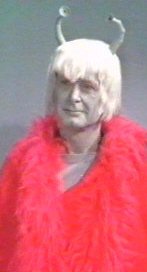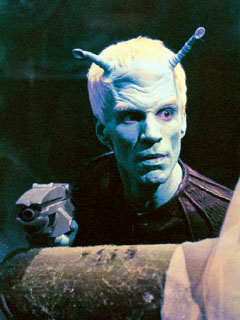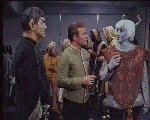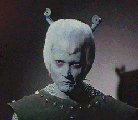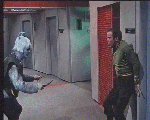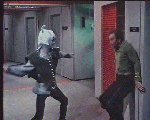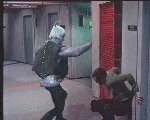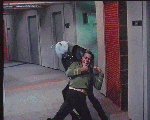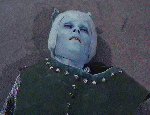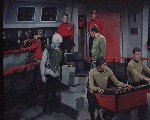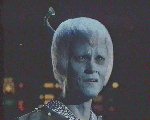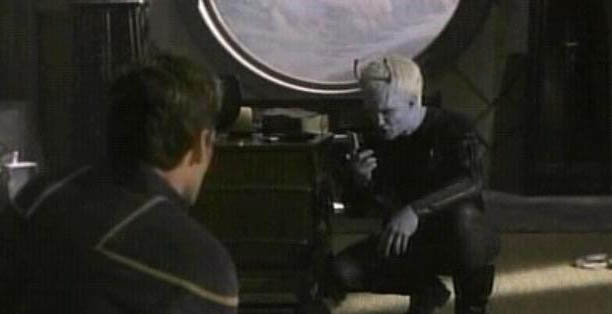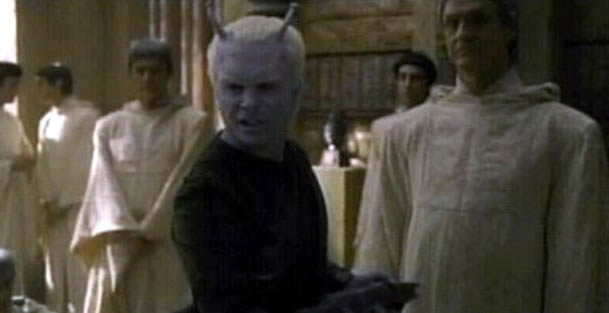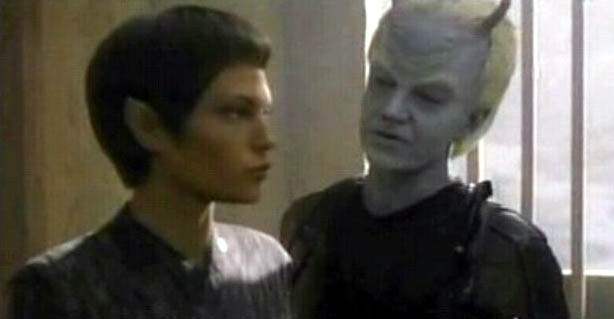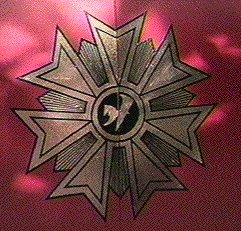
Federation Member

| Description | Humanoid/Insectoid, Bipedal |
| Size | Medium |
| Skin Pigment | Light Blue |
| Hair | White/Grey |
| Distinguishing Features | 2 long antennae on the top of head |
| Series | TOS: "Journey to Babel", TNG:
"Data's Day",
DS9: "In the Cards", ENT: "Shadows of P'Jem" |
| Planet of Origin | Andor (Native Name: Fesoan) AKA Procyon VIII |
| Quadrant | Beta (very near Alpha border) |
| Background | The history of this race was once a violent
one, based
on war and conquest. At the very beginnings of the Andorian
Cooperative
lifestyle was the Bond of the Words Unspoken, or the Khun-Haga, in
which
an individual pledged trust and service to the Tyk, in return for which
the Tyk pledged the same to the individual.
The Andorians understood that making this covenant a deep and binding extension of their thoughts and lives was the only thing that kept their fragile tribes safe and together, and being a stoic people, made it a point of honor to never speak to one another about the bond. No thanks were ever given for supporting the Tyk, and no explanations were ever offered to outsiders about the specific nature of the Tyk's unspoken bond. The only thing that was recognized by all was that the Khun-Haga was a force in Andorian life more powerful than the spectacular desert lightning, and herder to break than the rare and powerful bellium weapons forged by the first Delvers. They had a long-standing rivalry with the Vulcans before the Federation was founded. Since then relations have become more friendly, though occasional conflicts in belief arise. |
| Andorian Biology | They have characteristics of both mammals and
insects.
Like mammals, they are warm-blooded, bear their young live, and have an
internal skeletal structure to which their muscles attach. Like
insects,
they have antennae which provides better sensory input to vision and
hearing. They are all ambidextrous.
The antennae have very good color receptors in them, and also hold additional sound receptors. Their mechanisms for color vision and hearing are so good, they give Andorians the advantages of night-vision and ultrasonic hearing. If one antenna is destroyed, the Andorian can still "see" but at a loss of what was before. If both stalks are destroyed, the Andorian's senses becomes similar to humans. |
| Andorian Beliefs | Andorians believe in family above all else,
even public
duty. Unlike the custom of other Federation worlds, Andorian
marriages
require groups of four people. These marriages are very
complicated,
and involve a great deal of ritual. Their families are very large, due
to the fact that they are very prolific as well.
Andorians are a hard-working and serious folk, who are often but incorrectly viewed as humorless and irritable. In fact, Andorians have a complex set of propositional ``grammars'' by which they express humor, and as such they do not tend to find human humor amusing, nor do non-Andorians tend to ``get'' their humor. As to the irritability, the harsh history of early Andorian civilization has left a strong taboo against the appearance of frivolity or wasted effort. Andorians are hard working and often feel uncomfortable when invited to pursue purely recreational activities or pastimes. Their curt refusals often make them seem prudish or unsociable, while in fact they simply don't have a strong cultural pragmatism for engaging in such activities. Andorians are also reluctant to enter into strong personal relationships, another left over trait from their troubled past. This lack of a social skill so common in almost all other Federation races simply reinforces the sense of isolation and distance that others perceive between an Andorian and themselves. |
| Andorian Society | Andorian culture is founded on the belief of
a "Cooperative".
Currently a "Cooperative" is a group of 60 to 100 families who have
banded
together to pool their resources and abilities to provide for the whole
of their number. Cooperatives tend to grow around single lines of
endeavor or related centers.
As a young Andorian reaches his age of majority, he can either choose to remain with his own cooperative or seek to join another cooperative and establish a family line there. Some Andorians spend their early years alone, wandering from one city cluster to another, unable to decide on a Cooperative venture. These "wayfarers'' are unpopular within normal Andorian society and often tend to be attracted to anti-social Cooperatives, roving bands of ruffians and malcontents who roam the countryside. Andorian culture is divided into the "Coastal'' and the "Inland'' races. Those who live in coastal cities constitute about 60% of the total population, and have been the centers of technological development. The inland plains are home to semi-nomadic inland Cooperatives, who even today remain devoted to their ancient heritage. These cultural groups have minimal contact at this point, with increasing disdain on both sides. |
| Andorian Politics | Andorian society is an "empire" divided into
cooperative governments based on areas around major cities.
Before four hundred years ago, the largest social
structures
were these multi-cooperative walled cities that dot the southern and
western
coasts of Andor's more temperate continent. It has only been in
the
last several centuries that the notion of a government has been
developed.
Recently a new faith called 'innerism' has emerged. Beginning with Raikius, they believe a person should forget the false concept of warlike virtues, should leave old ways of living and should search a new "land to conquest" inside the self. Raikius is similar to the Vulcan Surak and his teachings are essentially similar, but while Surak believed in logic, Raikius feels logic to be false with respect to the complexity of real life. |
| Editors Notes | Visitors may find Andor a cold world, with
relatively thin atmosphere. Most of the population is in a narrow
temperate band around the equator, the majority of the land area is
tundra or artic climates. Winters are fairly long, but the summer
season can become quite hot. This may be due to an excentric
orbit around Procyon coupled with the star's large size and heat. Andorians will fight if challenged, or even challenge a foe themselves if they feel it to be necessary, they will never quarrel without a good reason. Also, they tend to remain quiet and listen to discussions until there is something with meaning to say. They are not usually very boisterous. Andorians characterize themselves as a violent race at one time, but members of this race make excellent scientists and are extremely dedicated. Many choose to specialize in botanic, social sciences, communications, navigation, and in side areas or theoretical physics, such the study of currents in space (places in deep space where heavy atoms are relatively common). Andorians are extremely disciplined, possessing a strong sense of duty and personal honor, and so they make excellent military officers. They are fond of technology, but they insist on its use with respect for nature. For this reason, their early wars of conquest were fought with a regard for planetary environment, and so the Andorians avoided much of the ecological devastation suffered by Terrans and many other cultures. |

